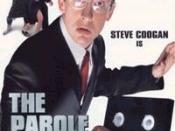Well lets start by learning what parole is and how it came about. What is Parole?
Parole, in criminal law, pledge of good conduct given by a person convicted of crime as a condition of release from imprisonment before the expiration of the term of confinement. The word parole is also broadly used to denote such a conditional release or period of liberty. Parole is usually granted to a prisoner in recognition of past good conduct, both in prison and earlier. A sentenced criminal may be released on parole before the maximum limit of the prison term has been reached, either on the expiration of the minimum term or of some other shorter term fixed by statute on condition of good behavior. The release in such case is not an absolute discharge, such as that received as a matter of right on the expiration of the full term, but is conditional on the due performance of the parolee's pledge.
During the same parole period the parolee is required to report from time to time to prison authorities or to a parole agent or parole officer to whose custody he or she was assigned when released. Other stipulations of parole include avoiding association with known criminals and remaining within a certain locality. For a violation of parole within the time limit, the parolee is liable to be apprehended and returned to prison to serve out the full or maximum term.
When someone is paroled, they serve part of their sentence under the supervision of their community. The law says that the U.S. Parole Commission may grant parole if (a) the inmate has substantially observed the rules of the institution; (b) release would not depreciate the seriousness of the offense or promote disrespect for the law; and (c) release would not jeopardize...



References
it would have been nice to see a reference list to follow your information. nice content.
0 out of 0 people found this comment useful.